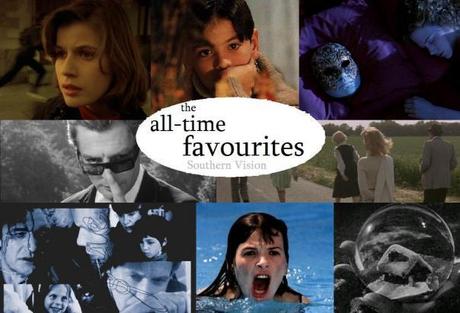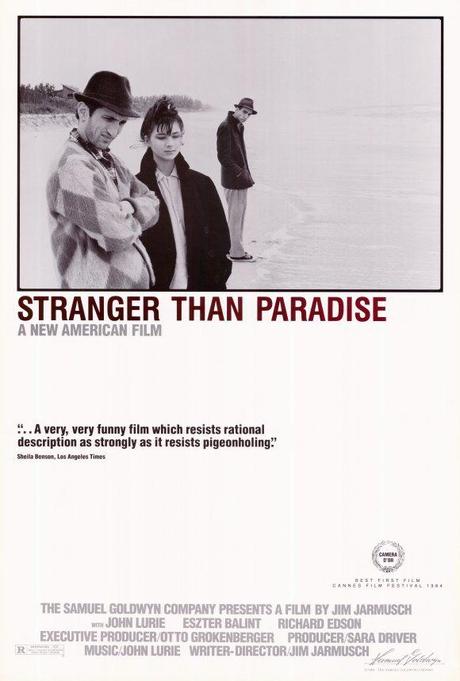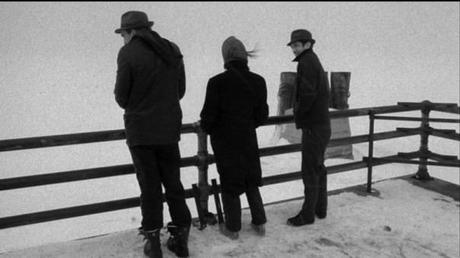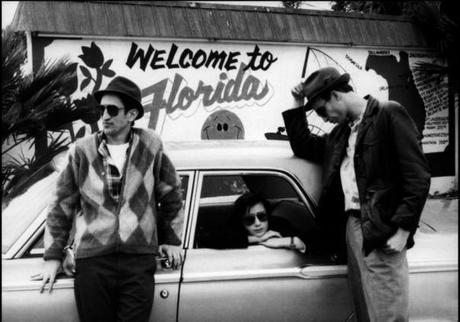
Welcome to the All-Time Favourites Series. This series examines 25 of the greatest films I’ve ever seen, looking at them in depth with analyses of what makes them great, and cutting down to the most basic level, looking at plot, cinematography, writing, direction, acting and other things, to see what makes these great films tick. For more on the series, click here. Today’s film is Stranger than Paradise (1984), an indie gem by Jim Jarmusch.

Jim Jarmusch is a director with the rare ability to take completely uninteresting people and make us deeply intrigued and close to them. Sometimes they are people we are nothing like, but more often than not, the average joe shares a lot of similarities with the characters in a Jim Jarmusch film. Indeed, Jarmusch prefers normal people who breeze through life contentedly to frantic, paranoid people with fears and plights. Stranger than Paradise is the best film of the 1980s, because it knows how normal people felt during that decade, their attitude toward life and the way they chose to live, and does not criticize it, nor does it make it look like heaven. It is content in observing it and allowing us to see too. The lives of the people in this movie are not perfect, and we can see that for some of them it has been hard. But their stoicism and resolute determination to just continue with life, come what may, is what makes them so attractive and interesting. It was what made Jeff Bridges’s “The Dude” such a memorable character, and it’s what makes Willie, Eddie and Eva so brilliant as well.
Willie is a typical New York hipster who plays poker and hangs out with his friend Eddie. They meet Eva, Willie’s Hungarian cousin, who comes briefly to stay with Willie before moving to her Aunt’s. The first 30 minutes or so of this movie shows the three of them bored to tears, getting on with their lives, and entertaining themselves in whatever ways possible. Eva plays a Screamin’ Jay Hawkins record which Willie despises. Willie has his revenge by telling her that when she uses the vacuum cleaner, she should refer to it as “choking the alligator.” Perhaps a little guilty, he buys her a dress. She doesn’t like it, but accepts it anyway. Then she leaves. The entire film consists of little things like this, presented in a series of one-take scenes separated by a black screen. There is nothing particularly interesting about each scene, but they all feel so pitch-perfect, so entertaining in their normality. We grow to love these characters after time, and simple things like hearing them speak and seeing them interact is a joy to watch. Willie and Eddie, the two charismatic hipsters, secretly fighting their affection for Eva (note that the film never becomes a romantic comedy for even a single second, and there is no sexual activity of any kind), reminded me of myself, a bumbling idiot who tries to be funny and rarely succeeds, but is still fun to be around. Eva is that quiet girl we all knew, who ended up being a lot smarter, funnier and pleasant than we expected. She certainly has good taste in American music.

I’ve never experienced greater pleasure simply observing film characters in the boredom of daily life than in Stranger than Paradise. Jim Jarmusch makes the simplest of activities exciting, and when the three characters take a trip to Florida in the film’s final act, the unexpected events that unfold aren’t all bunched up together but occur loosely, feeling natural and not as unlikely as they might in a different film. And even more vitally, the characters don’t overreact. They play themselves in a very understated manner, simply accepting events as they happen, both in good fortune and bad. When we see these characters at the start of the movie, we feel distant from them, observing them as “others” that we can’t identify with. Gradually, they win us over with their attitude, their dialogue, and their hapless acceptance of life. By the time we reach the end of the film, we have identified almost completely with them. They are, in their own way, a perfectly acceptable example of the ideal person.
I absolutely adore the three protagonists of Stranger than Paradise. They’re fun to watch, fun to listen to, and have an indelible charm that we can’t explain but still feel grateful for. They’re not like the overacting caricatures of modern Hollywood. When incredible fortune and unanticipated events strike in the film’s final act, there’s no jumping up and down or screaming or shouting. Their quietness is amusing and engaging, and to see them simply accepting the events that happen to them and not going crazy is refreshing and pleasing. If only more movies were like this, the cinema would be a much more interesting place. Willie, Eddie and Eva are my three main characters in any movie, not because they’re entertaining and engaging, but because they’re relatable in a way very few film characters are. The film is best summed up by it’s final spoken line, by Eddie. He is talking to himself and wonders “What are they gonna do in Budapest?” This is an ironic statement, considering throughout the movie they have barely done anything at all, but it personifies their attitude. To them, doing nothing is doing something, and they know how to have fun doing it.

To read other posts in the All-Time Favourites series, click here.

